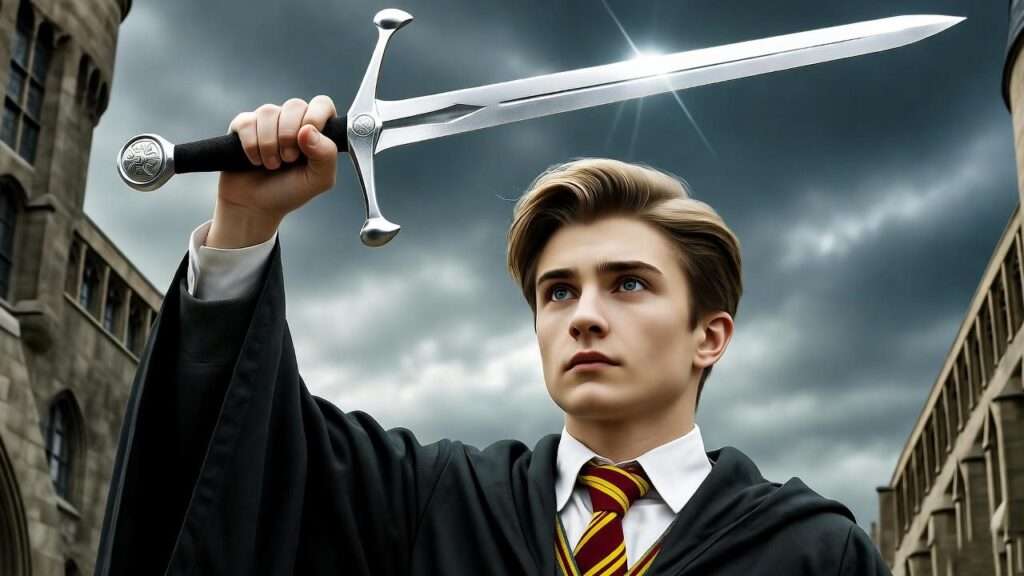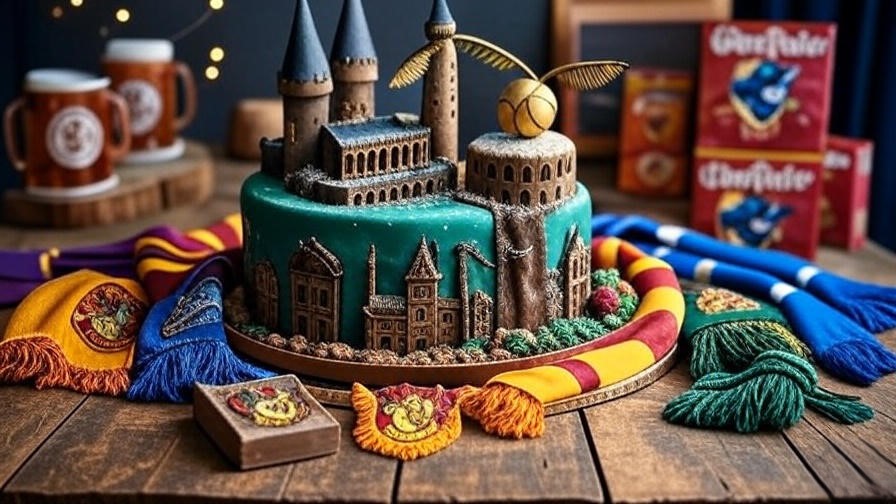Picture a nervous boy, tripping over his robes in the halls of Hogwarts, his toad Trevor slipping from his grasp, his face flushed with embarrassment as classmates snicker. This is Neville Longbottom in Harry Potter and the Sorcerer’s Stone, the epitome of awkwardness and self-doubt. Yet, by Deathly Hallows, this same boy wields the Sword of Gryffindor, defiantly slaying Voldemort’s snake, Nagini, in a moment that cements his legacy as a hero. How did Neville transform from a timid first-year to a cornerstone of courage? This comprehensive analysis on Neville Longbottom explores his remarkable journey, drawing from J.K. Rowling’s texts, psychological insights, and fan perspectives to uncover the depth of his character. For fans seeking inspiration from the Harry Potter series, Neville’s story offers a powerful lesson in resilience, self-belief, and the courage to rise above adversity.
This article delves into Neville’s evolution, his role in the fight against Voldemort, and his enduring impact on readers and popular culture. Backed by canon evidence, expert commentary, and real-world fan reactions, we’ll reveal why Neville’s transformation resonates so deeply, offering practical takeaways for anyone striving to overcome their own insecurities.
Who Is Neville Longbottom? A Character Overview
First Impressions in Sorcerer’s Stone
When we first meet Neville Longbottom in Harry Potter and the Sorcerer’s Stone, he’s a bundle of nerves, perpetually losing his toad or fumbling his spells. His round face and clumsy demeanor make him an easy target for Draco Malfoy’s taunts and Professor Snape’s disdain. Yet, even in these early moments, J.K. Rowling plants seeds of Neville’s potential. In a pivotal scene, Neville stands up to Harry, Ron, and Hermione to prevent them from sneaking out, earning Gryffindor crucial house points for his courage. As Rowling herself noted in a 2007 interview, “Neville’s bravery in standing up to his friends was a quiet but significant moment” (Bloomsbury Live Chat). This act foreshadows the hero he will become.
Background and Family Legacy
Neville’s story is inseparable from his family’s tragic history. Born to Frank and Alice Longbottom, renowned Aurors, Neville carries the weight of their legacy. His parents were tortured into insanity by Bellatrix Lestrange, leaving Neville to be raised by his formidable grandmother, Augusta. This trauma shapes Neville’s early insecurity, as he struggles to live up to the expectations of a pure-blood wizarding family. In Order of the Phoenix, we learn of his visits to St. Mungo’s Hospital, where his parents no longer recognize him—a heart-wrenching detail that adds depth to his character. This backstory, revealed gradually, underscores Neville’s internal battle to prove his worth.
Why Neville Resonates with Fans
Neville’s appeal lies in his relatability. Unlike Harry’s destined heroism or Hermione’s prodigious intellect, Neville’s struggles mirror the everyday challenges of self-doubt and perseverance. Fans on platforms like X frequently praise Neville as the ultimate underdog, with posts like, “Neville Longbottom is proof you don’t need to start confident to end up a legend” (@PotterFan23, 2024). His journey speaks to anyone who’s felt overlooked or underestimated, making him a beacon of hope. Literary scholar John Granger describes Neville as “the everyman hero,” whose growth inspires readers to find strength within themselves (The Deathly Hallows Lectures, 2008).
The Evolution of Neville’s Character Arc
Early Struggles and Self-Doubt (Books 1–3)
In the first three Harry Potter books, Neville is often the comic relief, his mishaps—like melting cauldrons in Potions or getting stuck in the Gryffindor common room entrance—drawing laughs. Yet, these moments mask a deeper struggle. Neville’s fear of failure is palpable, exacerbated by Snape’s relentless bullying and Draco’s cruel jibes. In Chamber of Secrets, Neville’s panic over the Basilisk highlights his vulnerability, yet his willingness to stay at Hogwarts despite the danger hints at untapped resilience. By Prisoner of Azkaban, his fear of Snape manifests in his Boggart, which takes the professor’s form—a poignant reflection of his insecurities. Still, Neville’s small victories, like mastering the Disarming Charm, show glimmers of potential.
Turning Points in Goblet of Fire and Order of the Phoenix
Neville’s arc takes a significant turn in Goblet of Fire, where his empathy shines. When Harry is tormented by visions of his parents’ deaths via the Dementors, Neville’s quiet understanding—rooted in his own loss—deepens their bond. In Order of the Phoenix, Neville joins Dumbledore’s Army, finding purpose in mastering defensive spells. His motivation is personal: learning of his parents’ fate at the hands of Bellatrix fuels his resolve. As he declares, “I’m doing this for them” (Order of the Phoenix, Ch. 30). His progress in D.A. marks a shift from clumsiness to competence, setting the stage for his later heroism.
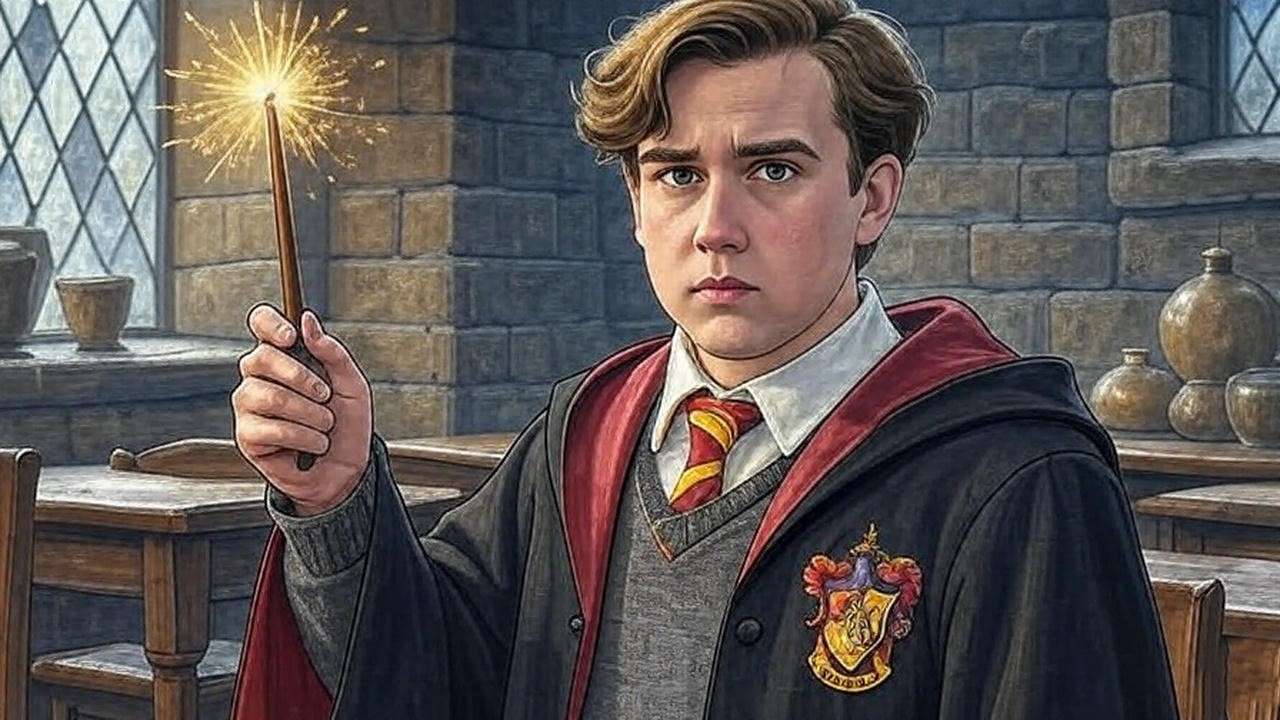
Heroic Transformation in Half-Blood Prince and Deathly Hallows
By Half-Blood Prince, Neville’s growth is evident. He fights alongside Harry at the Department of Mysteries, undeterred by danger. In Deathly Hallows, Neville emerges as a leader, rallying Hogwarts students against the Carrows’ regime. His defiance—“I’ll join you when hell freezes over!” (Deathly Hallows, Ch. 30)—is a far cry from the boy who once feared his own shadow. The pinnacle of his arc comes when he slays Nagini, fulfilling a crucial blow against Voldemort. This moment, described vividly by Rowling as “Neville’s finest hour” (Pottermore, 2016), cements his transformation into a true Gryffindor hero.
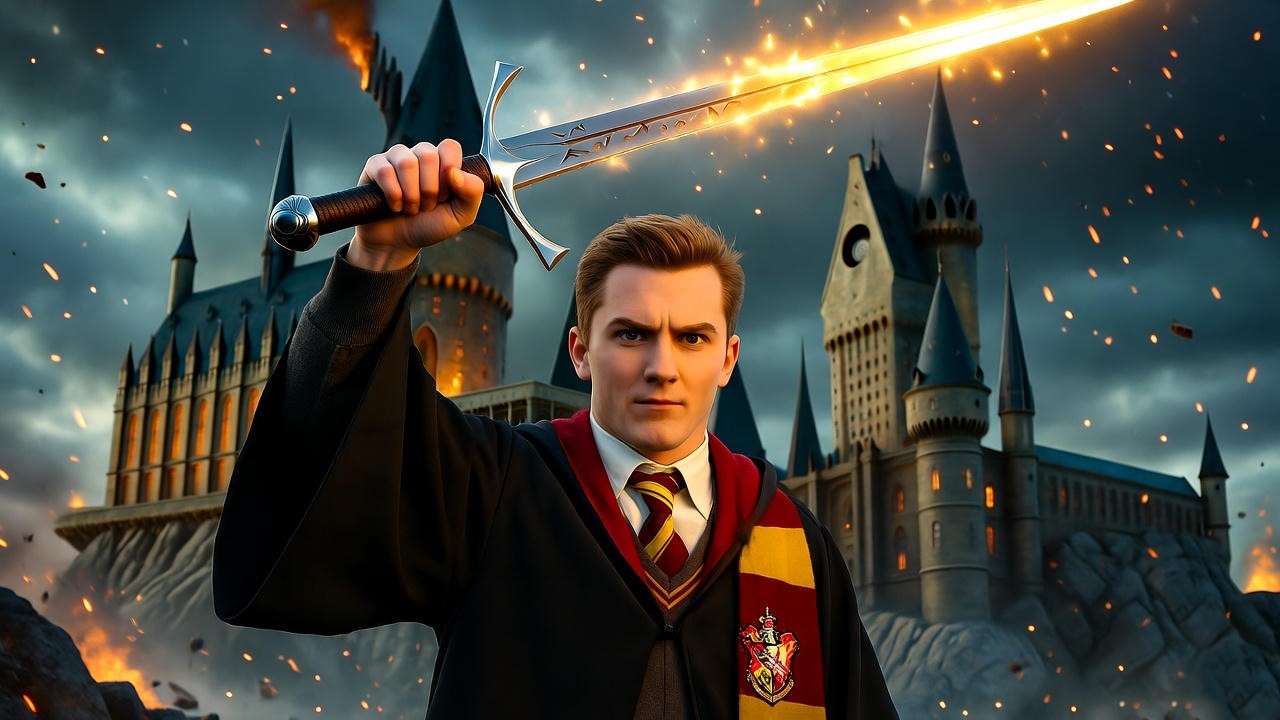
Psychological and Thematic Depth of Neville’s Journey
Overcoming Trauma and Building Resilience
Neville’s story is a masterclass in post-traumatic growth, a psychological concept where individuals find strength through adversity. The loss of his parents to insanity could have broken him, yet Neville channels this pain into purpose. His visits to St. Mungo’s, where he quietly endures his mother’s vacant gestures, reveal a resilience that grows over time. Psychologist Dr. Judith Herman notes that trauma survivors often rebuild through “small, consistent acts of agency” (Trauma and Recovery, 1992), a pattern Neville exemplifies as he joins Dumbledore’s Army and later leads the resistance.
The Power of Loyalty and Friendship
Neville’s friendships with Harry, Hermione, Ron, and Luna are pivotal to his growth. In Dumbledore’s Army, he finds a community that values him, boosting his confidence. Luna’s unwavering support, in particular, helps Neville embrace his quirks. As he tells Harry, “I’m worth twelve of you, Malfoy” (Order of the Phoenix, Ch. 23), a line that reflects his newfound self-assurance. These bonds highlight a key theme: loyalty as a catalyst for courage. Neville’s dedication to his friends and Hogwarts drives his transformation, making him a relatable figure for readers navigating their own relationships.
Symbolism of Neville as the “Almost Chosen One”
The prophecy revealed in Order of the Phoenix introduces a fascinating layer to Neville’s character: he could have been the Chosen One. Born at the end of July to parents who defied Voldemort, Neville fits the prophecy’s criteria. This “what-if” scenario underscores themes of choice and destiny. As Dumbledore explains, “The prophecy does not mean you have to do anything” (Order of the Phoenix, Ch. 37), emphasizing that Neville’s heroism is a product of his choices, not fate. This narrative choice by Rowling elevates Neville’s arc, showing that heroism is accessible to anyone who dares to act.
Neville’s Role in the Harry Potter Universe
Gryffindor’s Unsung Hero
Neville Longbottom embodies the core values of Gryffindor House—courage, chivalry, and determination—despite initially seeming an unlikely candidate. Unlike Harry, whose bravery is thrust upon him by destiny, or Ron, whose loyalty is tempered by moments of doubt, Neville’s heroism is hard-won through persistent effort. His early act of standing up to his friends in Sorcerer’s Stone earns Dumbledore’s praise: “It takes a great deal of bravery to stand up to our friends” (Sorcerer’s Stone, Ch. 17). This moment sets Neville apart as a Gryffindor who grows into his house’s ideals, proving that courage isn’t always loud or obvious. Compared to other Gryffindors, Neville’s quiet resilience makes him a unique symbol of the house’s diversity, showing that heroism comes in many forms.
Impact on the Fight Against Voldemort
Neville’s contributions to the war against Voldemort are indispensable. In Deathly Hallows, while Harry, Ron, and Hermione hunt Horcruxes, Neville leads the resistance at Hogwarts, enduring torture from the Carrows to protect younger students. His strategic use of the Room of Requirement as a safe haven demonstrates his leadership and resourcefulness. The climactic moment of slaying Nagini, one of Voldemort’s final Horcruxes, is not just a heroic act but a symbolic one—Neville destroys a piece of Voldemort’s immortality, paving the way for Harry’s victory. As J.K. Rowling noted in a 2015 tweet, “Neville’s act was pivotal; it showed he was no longer the boy who doubted himself” (@jk_rowling). This moment underscores Neville’s critical role in the series’ resolution.
Neville’s Legacy Beyond Hogwarts
After the Battle of Hogwarts, Neville’s story continues to inspire. He becomes a Herbology professor, a fitting role given his affinity for plants, as seen in his mastery of the Mimbulus Mimbletonia in Order of the Phoenix. His career choice reflects his nurturing nature and quiet strength, qualities that defined his growth. Rowling revealed in a 2014 Pottermore article that Neville marries Hannah Abbott, settling into a life of understated contentment. This ending reinforces his humility—he doesn’t seek fame but finds fulfillment in teaching and community. Neville’s legacy as a hero who never sought the spotlight resonates with fans who value authenticity over glory.

Why Neville’s Transformation Inspires Readers
Lessons in Courage and Self-Belief
Neville’s journey offers profound lessons for readers grappling with self-doubt. His transformation from a nervous boy to a confident leader teaches that courage is built through small, consistent actions. For example, his decision to join Dumbledore’s Army despite his inexperience shows that stepping out of one’s comfort zone is the first step toward growth. Fans can apply this in real life by:
- Embracing small challenges: Like Neville practicing spells in D.A., tackling minor tasks builds confidence.
- Persisting through failure: Neville’s early magical mishaps didn’t stop him, encouraging readers to view setbacks as learning opportunities.
- Seeking support: Neville’s growth was bolstered by friends, reminding readers to lean on their communities.
These practical takeaways make Neville’s story a blueprint for personal development, resonating with anyone striving to overcome insecurities.
Representation of the Underdog Archetype
Neville’s arc aligns with the classic underdog archetype, akin to characters like Samwise Gamgee from The Lord of the Rings. Literary critic Marina Warner notes that underdogs “embody the hope that effort and heart can triumph over adversity” (From the Beast to the Blonde, 1994). Neville’s journey from being underestimated to becoming indispensable mirrors this archetype, making him universally relatable. His struggles with bullying and self-worth strike a chord with readers who feel overlooked, while his eventual triumph offers hope. On X, fans often share sentiments like, “Neville Longbottom is the hero we all secretly want to be” (@HogwartsHeart, 2025), highlighting his enduring appeal.
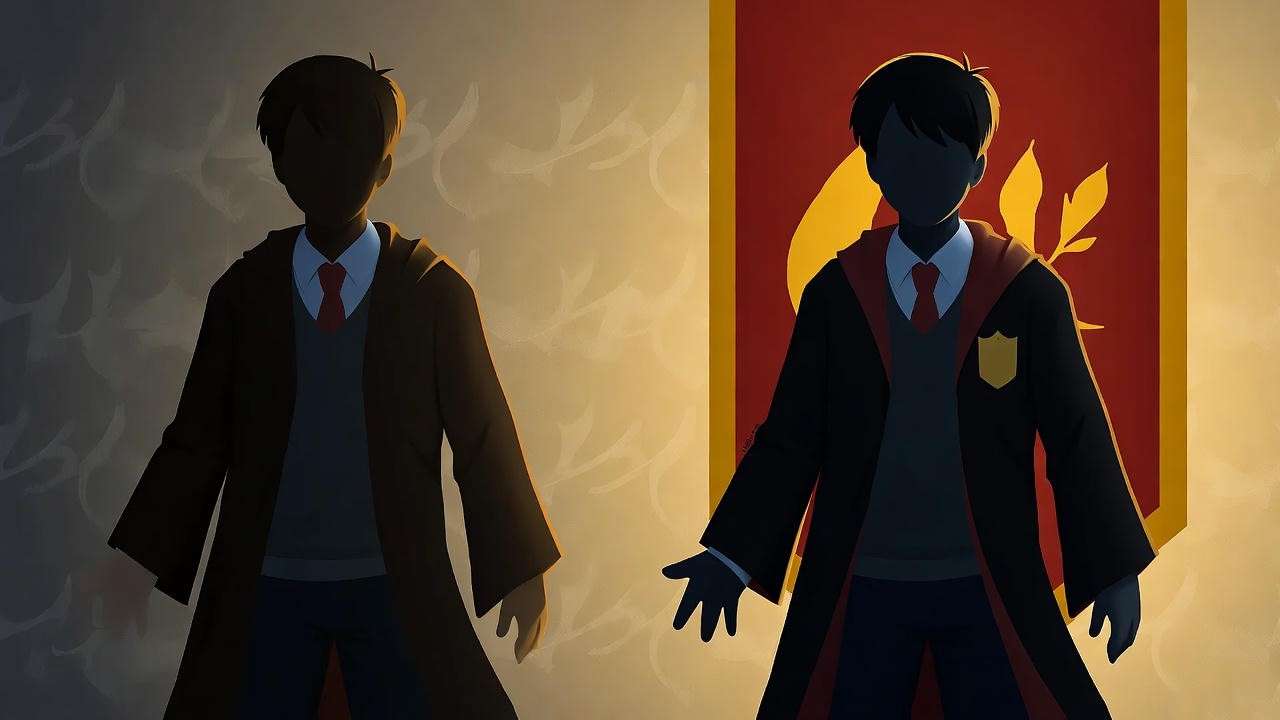
Fan Reactions and Cultural Impact
Neville’s popularity extends beyond the books, as seen in fan communities on Reddit and X. A 2024 Reddit thread on r/HarryPotter praised Neville as “the character who grew the most,” with users citing his Nagini-slaying moment as a fan favorite. Actor Matthew Lewis, who portrayed Neville in the films, reflected on his role in a 2023 interview: “Neville’s arc taught me that anyone can find strength if they keep pushing forward” (Wizarding World Podcast). This sentiment echoes across fan discussions, where Neville’s “glow-up” is celebrated through memes and fan art, solidifying his status as a cultural icon.
Neville Longbottom in Popular Culture
Portrayal in the Harry Potter Films
Matthew Lewis’s portrayal of Neville in the Harry Potter films brings the character to life, though with some differences from the books. The films emphasize Neville’s physical transformation, with Lewis’s “glow-up” becoming a fan-favorite topic. Key scenes, like Neville’s speech rallying Hogwarts in Deathly Hallows: Part 2, amplify his heroism, though the films omit details like the prophecy’s ambiguity. While book Neville’s growth is more gradual, the films streamline his arc for cinematic impact. Despite these differences, Lewis’s performance captures Neville’s heart, earning praise from fans and critics alike.
Neville in Fan Fiction and Fan Art
Neville’s story inspires a wealth of fan-created content. On platforms like Archive of Our Own, fan fiction explores alternate scenarios, such as Neville as the Chosen One or his post-war adventures as a professor. Fan art often depicts his Nagini-slaying moment, with vibrant illustrations shared on X captioned, “Neville proving he’s a true Gryffindor” (@PotterArtistry, 2024). Popular fan theories, like Neville’s Herbology skills hinting at untapped magical prowess, add depth to his character, showcasing fans’ creativity in expanding his legacy.
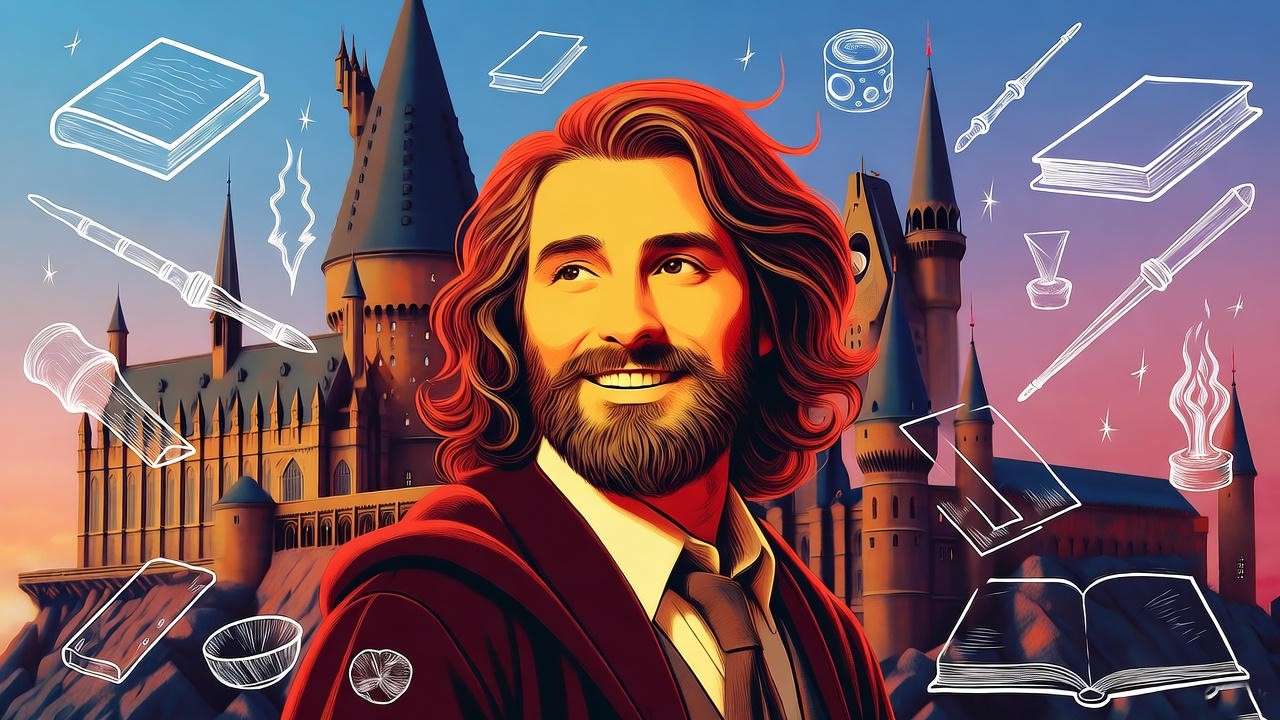
Memes and Social Media Presence
Neville’s transformation has become a meme phenomenon, with “Neville Longbottom glow-up” trending on X and TikTok. Memes juxtaposing his awkward early years with his heroic finale resonate with fans, often captioned with humorous takes like, “Neville went from toad-loser to Dark-Lord-destroyer” (@WizardMemes, 2025). These viral moments amplify Neville’s cultural footprint, making him a relatable figure for younger audiences who engage with Harry Potter through social media.
Expert Insights and Literary Analysis
J.K. Rowling’s Intentions for Neville
J.K. Rowling crafted Neville to subvert traditional notions of heroism. In a 2011 Pottermore post, she wrote, “Neville was always meant to show that ordinary people can do extraordinary things.” By giving him a humble beginning and a triumphant end, Rowling challenges the idea that heroes are born, not made. Her choice to make Neville a potential Chosen One adds narrative depth, emphasizing that heroism is about action, not destiny. This intentional design makes Neville a standout character in the series.
Literary Devices in Neville’s Arc
Rowling employs several literary devices to craft Neville’s arc. Foreshadowing, like his early defiance in Sorcerer’s Stone, hints at his future bravery. Neville serves as a foil to Harry, highlighting different paths to heroism—Harry’s is destined, while Neville’s is chosen. The narrative structure of gradual growth, with pivotal moments in each book, builds suspense and emotional payoff. Literary critic John Granger argues, “Neville’s arc is a masterclass in character development, showing how incremental change leads to transformation” (The Deathly Hallows Lectures, 2008).
Neville’s Role in the Hero’s Journey Framework
Applying Joseph Campbell’s Hero’s Journey, Neville’s arc follows a clear trajectory. His “ordinary world” is one of insecurity and doubt, disrupted by the “call to adventure” in Dumbledore’s Army. He faces trials (e.g., battling Death Eaters), undergoes transformation (leading the resistance), and achieves his “reward” by slaying Nagini. This framework highlights Neville’s universal appeal, as his journey mirrors the struggles and triumphs of readers seeking their own heroic moments.
Practical Takeaways for Fans and Readers
Applying Neville’s Lessons to Real Life
Neville’s story offers actionable insights for personal growth:
- Take small steps toward courage: Like Neville joining D.A., start with manageable challenges to build confidence.
- Learn from failure: Neville’s early mistakes didn’t define him; they taught him resilience.
- Build a supportive network: Neville’s friends helped him thrive, emphasizing the value of community.
- Embrace your strengths: Neville’s Herbology talent became his legacy, encouraging readers to find their unique skills.
How to Revisit Neville’s Story
To deepen your appreciation of Neville, revisit key moments:
- Books: Re-read Order of the Phoenix (Ch. 23–30) for his D.A. journey and Deathly Hallows (Ch. 30–36) for his heroic stand.
- Films: Watch Deathly Hallows: Part 2 for Neville’s rallying speech and Nagini scene.
- Additional Content: Explore Pottermore articles or podcasts like MuggleCast for Neville-focused discussions.
Engaging with the Harry Potter Community
Join the conversation about Neville on platforms like X or Reddit’s r/HarryPotter. Share your favorite Neville moment or ask, “How did Neville inspire you?” Engage with fan art or fan fiction to connect with others who admire his journey.
Neville Longbottom’s transformation from a timid, toad-losing boy to a sword-wielding hero is one of the most compelling arcs in the Harry Potter series. His journey through trauma, self-doubt, and eventual triumph teaches us that courage is cultivated, not innate. By embodying Gryffindor values, leading the resistance, and inspiring fans worldwide, Neville proves that anyone can rise to greatness. Share your thoughts on Neville in the comments or on X, and explore more character analyses on our blog to continue your Hogwarts journey. Like Neville, may you find the strength to face your fears and shine.
FAQs
- Could Neville have been the Chosen One instead of Harry?
The prophecy’s ambiguity means Neville fit its criteria, but Harry’s choices defined him as the Chosen One. Neville’s heroism shows he could have risen to the challenge. - Why is Neville so important to the Harry Potter series?
Neville’s growth from underdog to hero adds emotional depth, symbolizing resilience and the power of choice. - How does Neville’s Herbology talent tie into his character arc?
His skill reflects his nurturing, patient nature, mirroring his growth into a steady, reliable leader. - What differences are there between book Neville and movie Neville?
Book Neville’s arc is more detailed, with prophecy context, while the films focus on his physical and heroic transformation.

